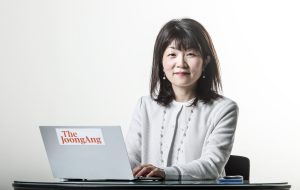In an epoch-making move, South Korea’s major daily newspaper The JoongAng announced on March 27 that it has hired a former Japanese Mainichi Shimbun newspaper reporter, Onuki Tomoko, 48, as its Tokyo correspondent. It said it’s the first time that any South Korean newspaper has employed a Japanese reporter as a staff writer.
It has been long regarded as difficult – or almost impossible – for any Japanese reporter to work for South Korean media. This is because traditionally, South Korean media outlets have been seen by Japanese as very nationalistic and keen to report on many politically and socially sensitive issues related to Japan’s former colonization of the Korean Peninsula (1910–1945). Contentious topics include compensating Korean laborers who toiled for Japanese businesses during World War II and the so-called comfort women who worked in Japanese military brothels during the war, as well as the territorial dispute between the two nations over the tiny islets called Dokdo in South Korea and Takeshima in Japan.
Recently, South Korean President Yoon Suk-yeol and Japanese Prime Minister Kishida Fumio have made efforts to restore “sound bilateral relations” after years of chilly ties. This latest move in East Asian journalism represents yet another sign of a healthier bilateral relationship between Seoul and Tokyo.
“The JoongAng and JTBC, which have led innovation and change in Korean media, will take on a new challenge. Onuki Tomoko, a reporter who has covered Japan’s domestic politics and diplomacy, South Korea-Japan relations, and North Korea issues in depth for 24 years for a Japanese daily, has joined us as a Tokyo correspondent,” The JoongAng said in a statement on March 27.
Onuki joined Mainichi Shimbun in 2000 after graduating from Waseda University in Tokyo. She served as Seoul correspondent from 2013 to 2018. She visited North Korea in 2012 and 2016 and covered eastern North Korea, including Wonsan and Hamheung.
“This is an experiment to discover more differentiated content from a new perspective and angle that Korean media has not approached before. We unearth news and information that meets the demands and expectations of our readers through deeper reporting sources and from the field,” The JoongAng said.
“By doing so, we would like to help to provide an accurate understanding of our inseparable neighboring country, Japan, and present solutions to various problems such as the declining birthrate and aging population that both countries are facing,” it added.
Onuki hopes to meet these expectations of her new employer.
“I wanted to take on a new challenge in life while I was in my 40s. Up until now, I had looked at South Korea from the Japanese side, but from now on I would like to look at Japan from the South Korean side and think about a new Japan-Korea relationship,” she told The Diplomat earlier this month.
Experts familiar with Japan-South Korea relations have welcomed the move.
“I was so surprised when I heard this news. It’s amazing. It’s a sign of the changing times,” Okonogi Masao, professor emeritus at Keio University in Tokyo, said with great admiration.
Tsukamoto Soichi, a former NHK Seoul bureau chief and a professor at J. F. Oberlin University in Tokyo, pointed out that The JoongAng’s hiring of Onuki had two major meanings.
The first point he cited is a change in South Korea’s attitude toward Japan.
“I think JoongAng Ilbo now expects its readers and the general public will not object much to the entry of a Japanese reporter into the Korean media, and this shows how much the South Korean side has ceased to view Japan as special, or is even less aware of it,” Tsukamoto said.
The second meaning Tsukamoto mentioned is that it symbolizes a change in the way Japanese journalists cover South Korea.
“During South Korea’s democratic struggle in the 1980s, reporting on city news and crimes was considered most important, and many of the Japanese journalists stationed in Seoul were from their media’s social affairs departments and did not necessarily speak Korean,” Tsukamoto said.
However, Tsukamoto pointed out this situation has changed: “It has become almost commonplace for Japanese reporters to speak Korean and be familiar with South Korean affairs, and they are now able to conduct in-depth reporting on Japan-South Korea relations and North Korea issues.”
“Nowadays, there are more female reporters, and they are broadening their coverage by focusing on new issues such as gender and social disparity. Ms. Onuki also wrote a book that traces the back side of the history of Japan and Korea through the love story of a married couple. I think this is one of the new aspects of Korean reporting by Japanese journalists,” he also said, pointing to Onuki’s achievements as a reporter.
It is true that there have been many journalists from Japanese media who have contributed to Korean media as columnists. Narikawa Aya, a former Asahi Shimbun reporter and cultural journalist living in South Korea, is one of them.
“I think behind this move is The JoongAng’s breadth of policy,” said Narikawa, who has been writing for the South Korean paper since 2017.
“Even though I receive requests from the newspaper to write about certain topics, I have never received any interference asking me to write this or that. I feel that the newspaper respects the perspectives of foreigners,” Narikawa said.
“In particular, Japan and Korea can refer to each other on various issues such as the declining birthrate and aging population. And so I believe that her [Onuki’s] role in JoongAng Ilbo will be meaningful for both countries.”
Narikawa went on to praise Onuki, saying, “I think it’s a groundbreaking thing to be able to utilize her experience as a Seoul correspondent for the Mainichi Shimbun as a Tokyo correspondent for a Korean newspaper.”

































